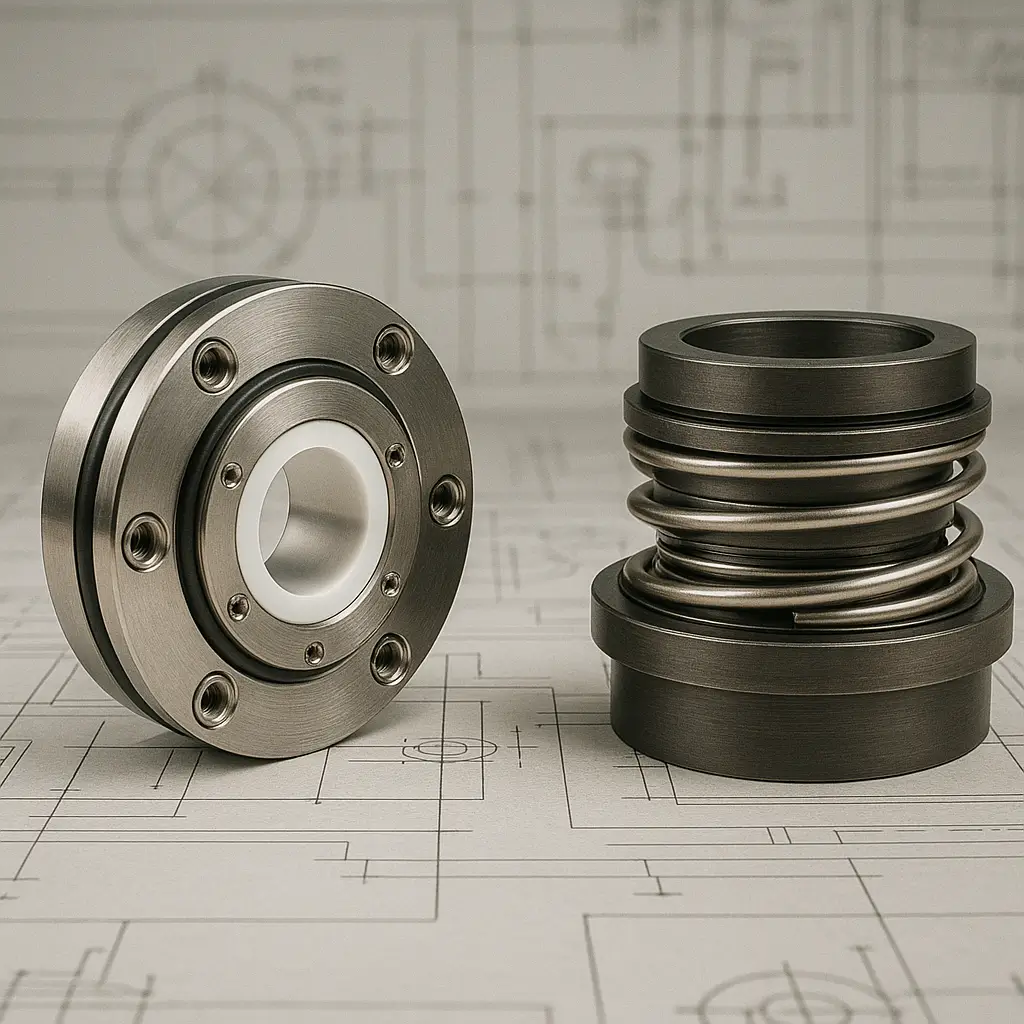

December 16, 2024
Dry Gas Seals vs. Wet Seals: Choosing the Right Technology for Your Industrial Applications
When it comes to sealing technology in rotating equipment, the choice between dry gas seals and wet seals has a significant impact on operational efficiency, cost, and reliability. Reliability Engineering Industries provides expertise and solutions in both technologies, supporting a wide range of industrial applications with seals tailored to specific operational demands.
Understanding the differences between dry gas seals and wet seals helps operators make informed decisions about which system best suits their environment, performance requirements, and maintenance objectives.
What Are Dry Gas Seals?
Dry gas seals operate without the need for a liquid barrier. Instead, they use a thin gas film, typically nitrogen, to create a non-contacting seal between rotating and stationary components. These seals are widely used in compressors and high-speed machinery, where minimal friction and low wear are essential.
Reliability Engineering Industries offers dry gas seals designed for high-performance environments, providing efficient sealing while reducing energy loss and contamination risks.
What Are Wet Seals?
Wet seals, also known as mechanical seals with a liquid barrier, use fluid—often oil or water-based—to create a seal. The liquid serves to lubricate the seal faces and dissipate heat generated by friction. Wet seals are commonly used in pumps, mixers, and agitators where operating conditions involve lower speeds and higher fluid contact.
Reliability Engineering Industries manufactures wet seals with precision, ensuring reliable operation and long service life in demanding industrial settings.
Key Differences Between Dry Gas Seals and Wet Seals
- Lubrication Medium:
Dry gas seals use a gas film for sealing, whereas wet seals rely on liquid lubrication. - Energy Efficiency:
Dry gas seals typically offer greater energy efficiency due to reduced drag and lower cooling requirements. Wet seals, while robust, may require additional energy for circulation and cooling of the barrier fluid. - Maintenance Requirements:
Dry gas seals generally require less frequent maintenance, as they experience less wear. Wet seals may require regular inspection and fluid replenishment. - Environmental Impact:
Dry gas seals have lower emissions due to the absence of liquid leakage, making them more environmentally friendly. Wet seals, if not properly maintained, can leak fluids, posing potential environmental and safety concerns. - Application Suitability:
Dry gas seals are ideal for high-speed compressors and critical gas-handling applications. Wet seals are better suited for lower-speed equipment handling liquids.
Advantages of Dry Gas Seals
- Reduced Leakage: Minimal gas leakage helps maintain system integrity.
- Lower Operating Costs: Less friction and no need for fluid management systems.
- Clean Operation: No risk of process fluid contamination.
- Extended Seal Life: Non-contact design reduces wear on sealing surfaces.
Advantages of Wet Seals
- Proven Technology: Widely used in many industries with extensive operational history.
- Effective in Liquid Applications: Suitable for processes involving slurries or contaminated fluids.
- Cost-Effective Initial Investment: Often lower upfront costs compared to dry gas systems.
Industry Applications for Dry Gas Seals
- Oil & Gas Processing: Used in high-speed gas compressors.
- Petrochemical Plants: Suitable for clean, non-contaminating environments.
- Power Generation: Supporting gas turbine and compressor systems.
Industry Applications for Wet Seals
- Chemical Processing: Handling a variety of fluids in pumps and mixers.
- Water Treatment: Used in pumps handling slurries or wastewater.
- Pharmaceutical Manufacturing: Suitable for processes requiring liquid barrier protection.
Choosing the Right Seal for Your Operation
The decision between dry gas seals and wet seals depends on several factors, including operating pressure, temperature, fluid type, environmental regulations, and cost considerations.
Reliability Engineering Industries works closely with clients to assess their specific needs and recommend the most suitable sealing technology. With expertise in both dry gas and wet seals, the company ensures that each solution delivers long-term value, efficiency, and operational reliability.
The team at Reliability Engineering Industries uses advanced design and testing methods to ensure that every seal meets the highest standards of performance and safety. Their in-depth knowledge of industry requirements makes them a trusted partner for sealing solutions across sectors.
Contact Reliability Engineering Industries Today
Need help determining whether dry gas seals or wet seals are right for your application? Contact Reliability Engineering Industries today for expert guidance and reliable sealing solutions tailored to your operational needs.
Suggested posts
No items found.




